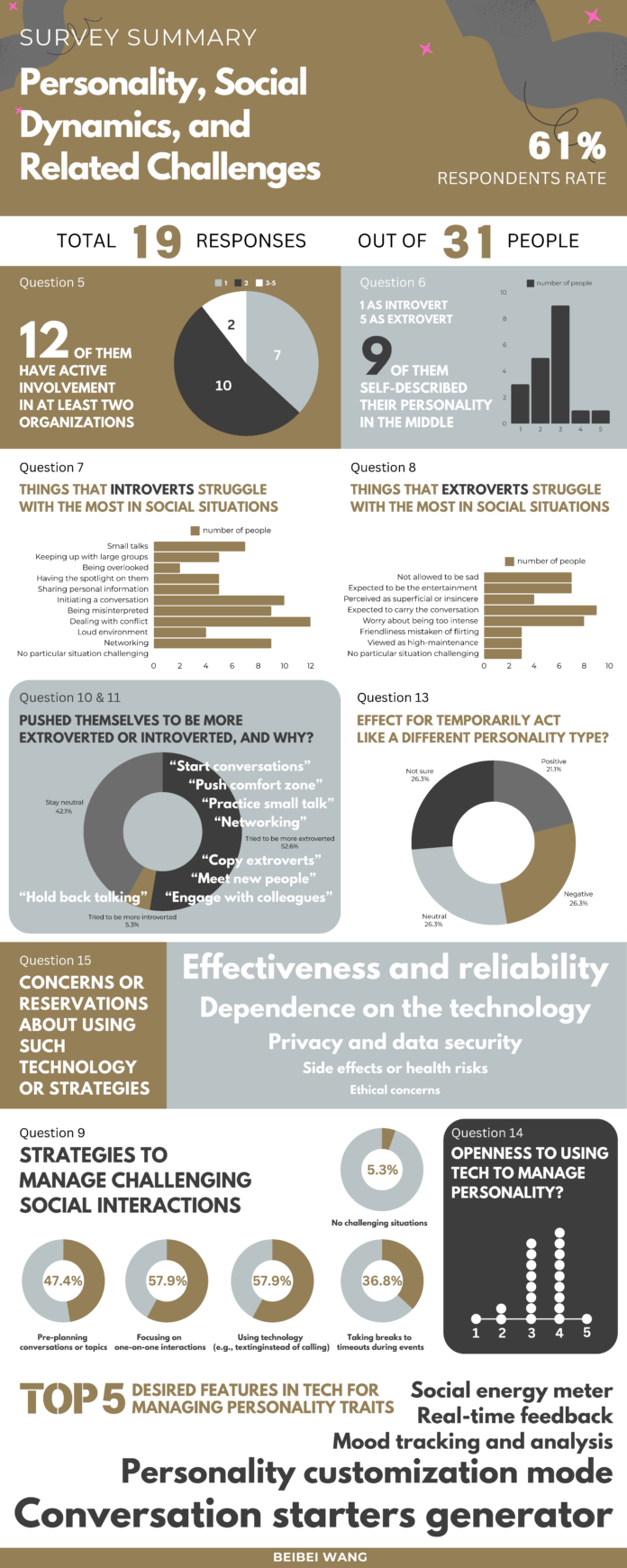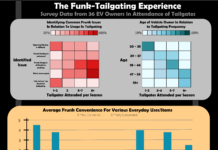Process Summary:
I spent a lot of time on my research because I was hesitant to start my survey. I wasn’t sure if I wanted to focus on this specific topic and wasn’t certain about what I wanted to learn from the survey. Initially, I was going to focus on diabetes research, but due to my limited access to diabetes groups, I wasn’t able to conduct thorough research on this topic. Therefore, I shifted my focus to mood enhancement. From there, I explored the social aspect of mood enhancement, which led me to become interested in social dynamics and challenges. I was able to identify some student organizations on campus that I wanted to survey. I reached out to three organizations: Buckeyes Raising Awareness in Neuroscience, the Chinese Women’s Basketball Club, and the Bad Singers Karaoke Club. I chose these organizations because I believe they involve teamwork, individual performance, dealing with conflicts, and getting to know each other within the group—all of which align with the focus of my research.
As a result, I only received responses from the Chinese Women’s Basketball Club, likely due to my personal connection to the club as a member. During the first week of sending out the survey, I received 15 responses. By the second week, the total number of responses reached 19, out of a group of 35 members in the organization.
One thing I noticed is that I don’t have “0” listed in my question 14. I originally worded it to ask to what extent they are open to using technology to manage personality. Then when analyzing my survey, I realized the scale started from 1 to 5. This means there could be a possibility that the users didn’t have a chance to choose “0,” which would indicate they are not open to using such technology.
Review:
The most important takeaway from this survey comes from Question 6, where asks users to rate themself as introverted or extroverted on a scale of 1 to 5, with 1 being introverted and 5 being extroverted. The results show that 9 out of 19 rated themselves as 3, which is in between introverted and extroverted, and 5 out of 19 rated themselves as 2. Two people consider themselves introverts, and one person rated themselves as extroverted. This actually intrigued me and allowed me to draw a connection to one of the articles we referenced, which states that there are no true introverts or extroverts; if there were, they would likely need medical attention. This really surprised me.
This makes me think that most people don’t fit neatly into the labels of introvert or extrovert. It aligns with the notion that personality is dynamic, which provides an interesting aspect for the design of mood enhancement technologies. It also suggests that any technology aimed at influencing personality needs to consider this fluidity. Additionally, ethical considerations are crucial. Given that no one is truly 100% introverted or extroverted, the goal of such technology shouldn’t be to force users into one mode or the other but rather to respect their natural balance and individuality. This leads to the idea that personalization is key to making the technology more practical and user-friendly. The design should empower users rather than constrain them into predefined categories. I also learned that less than one-fourth of the respondents believed there would be a positive effect in temporarily acting like a different personality type, while nearly 80% chose negative, neutral, or unsure responses. From this, I think the focus should be on helping users feel more comfortable in specific contexts or manage their social energy more effectively, rather than promising a transformation into a more extroverted or introverted version of themselves.
This survey has given me a better understanding of the concerns or reservations people have about using such technology. It also reinforces the idea that personality is complex, fluid, and highly individualized. Any future development of mood enhancement devices should take these subtleties into account, ensuring users have control over how much influence the technology exerts and that the design is flexible enough to accommodate the diversity of human personality.
Survey Questions and Flow:
Thank you for participating in this survey on personality traits, social dynamics, and related challenges. Your responses will help me better understand how different personality types navigate social environments and the potential interest in technologies or strategies to manage personality traits. Your participation is voluntary, and all answers will remain confidential. The data collected will be used solely for research purposes. By proceeding, you consent to the use of your anonymous responses for this research.
If you agree to participate, please continue with the survey. If you have any questions or concerns, please contact [wang.13923@osu.edu].
Do you consent to participate in this survey?
1. What is your gender?
- Male
- NO
- Non-binary/Third gender
2. What is your current education level?
- Freshman
- Sophomore
- Junior
- Senior
- Graduate Student
- PhD Student
3. Through which organization did you hear about this survey?
- Buckeyes Raising Awareness in Neuroscience
- Chinese Women’s Basketball Club
- Bad Singers Karaoke Club
4. What is your position or role in the organizations you participate in?
- Member
- Leader/President
- Vice President
- Treasurer
- Secretary
5. How many organizations are you actively involved in?
- 1
- 2
- 3-5
- More than 5
6. How would you describe your personality?

7. According to HackSpirit(https://leaders.com/articles/personal-growth/extroverted-introvert/), 10 things that introverts struggle with most in social situations are listed below. What social situations do you find most challenging? (Select all that apply)
- small talks(7)
- Keeping up with large groups(5)
- Being overlooked(2)
- Having the spotlight on them(5)
- Sharing personal information(5)
- Initiating a conversation(10)
- Being misinterpreted(9)
- Dealing with conflict(12)
- Loud environment(4)
- Networking(9)
- I don’t find any particular situation challenging(0)
8. According to SusieMoore(https://susie-moore.com/confidence/struggles-every-extrovert-understands/), 7 things that extroverts struggle with most in social situations are listed below. What social situations do you find most challenging? (Select all that apply)
- Not allowed to be sad(7)
- Expected to be entertainment(7)
- Perceived as superficial or insincere(4)
- Expected to carry the conversation(9)
- Worry about being too intense(8)
- Friendliness mistaken for flirting(3)
- Viewed as high-maintenance(3)
- I don’t find any particular situations challenging(3)
9. Do you use any strategies to manage challenging social interactions? If so, which strategies do you use? (Select all that apply)
- Pre-planning conversations or topics(9)
- Taking breaks or timeouts during events(7)
- Focusing on one-on-one interactions(11)
- Using technology(e.g., texting instead of calling)(11)
- I don’t find any particular situations challenging(1)
10. Have you ever had to push yourself to be more extroverted if you are primarily introverted, or more introverted if you are primarily extroverted?
- Yes, I have tried to be more extroverted(10)
- Yes, I have tried to be more introverted(1)
- No, I have not felt the need to pretend to be the opposite of my natural personality(8)
11. If you said YES to the previous question, could you explain why and how you managed it? If you said NO, just comment NO.
12. Are there situations where you wish you could experience being more introverted or extroverted?
- Yes, frequently
- Occasionally
- No, I am satisfied with my current personality balance
13. What effects do you think might happen if you temporarily act like a different personality type (for example, an introvert acting like an extrovert, or vice versa)?
- Positive effects
- Negative effects
- No significant effects
- Not sure
14. How open are you to using technology (e.g., wearable devices, apps) or other strategies to help manage or adapt your personality traits in certain situations?

15. What concerns or reservations would you have about using such technology or strategies? (Select all that apply)
- Privacy and data security
- Side effects or health risks
- Dependence on the technology
- Ethical concerns
- Effectiveness and reliability
16. Is there any specific functionality or feature you would like to see in a technology designed to help manage or adapt personality traits?(Select all that apply)
- Mood tracking and analysis(6)
- Real-time feedback(6)
- Virtual role-playing(2)
- Personality customization mode(8)
- Personalized coaching(4)
- Social energy meter(6)
- Micro-goal setting(2)
- Conversation starters generator(9)
- Mindfulness integration(4)
- Daily personality insights(3)
- Remote social support(3)
- Privacy control(4)
- Emotional reset button(4)
- Customized alerts for social opportunities(2)
- Gamification(2)
- Voice modulation and body language coaching(2)
If you have any additional questions or feedback, please comment below:
Thank you for completing this survey! If you’d like to receive updates on the findings or if you are open to being contacted for follow-up questions, please provide your email below. Your information will remain confidential and will only be used for the purposes specified.
Reference:
OpenAI. (2024). ChatGPT (September 22, Version GPT-4) [Large language model for correcting grammar]. https://chat.openai.com/
Grammarly. (n.d.). Grammarly [Grammar correction tool]. https://www.grammarly.com/




